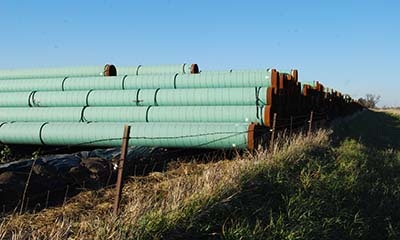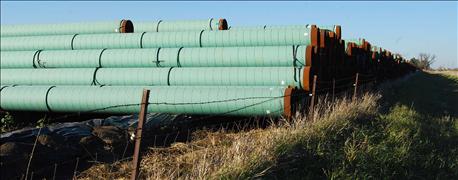March 12, 2016

The last state permit needed for a pipeline that will carry a half-million barrels of crude oil daily from North Dakota to Illinois was approved March 10 by Iowa utilities regulators. The Iowa Utilities Board also gave the Texas-based company wanting to build the pipeline authority to use legal power of eminent domain to get access to land farmers and other property owners are unwilling to voluntarily sign easements for, in exchange for payments of fair market value.

READY TO GO: A Texas company wanting to build a crude oil pipeline across 346 miles of Iowa anticipated a favorable ruling by state officials to allow the pipeline to be built. A year ago, the company began stockpiling huge amounts of pipe at several locations along the proposed route.
There are 1,295 tracts of land along the Iowa section of the pipeline route, and most property owners have signed voluntary easements. But the owners of 296 of those parcels have refused to grant easements. These owners may fight land condemnation proceedings at the county level and appeal their individual cases to district court.
Public hearings leading up to the IUB’s decision were well-attended and highly watched. The decision pits private property rights and environmental concerns against domestic energy security, job creation and economic benefits. Almost as quickly as the three-member Iowa Utilities Board unanimously announced approval of a permit for the $3.8 billion interstate pipeline, opponents in the hearing room at IUB offices in Des Moines announced plans to appeal the decision to district court, saying “this is not over.”
Power of eminent domain would be used to take farmland
The approval gave a private company, Dakota Access LLC, a subsidiary of Energy Transfer Partners of Houston, Texas, the power to use eminent domain to involuntarily take private farmland in the name of a for-profit endeavor. “The IUB came down on the side of a Houston company’s profits over what is best for Iowa,” said Kim Skadeland, a Larrabee, Iowa farmer, who has 80 acres in the path of the proposed route. “It certainly felt like they had their minds made up several months ago to approve it.”
The IUB voted 3 to 0 to adopt a 175-page order granting the hazardous liquid pipeline permit to Dakota Access, and the power to use eminent domain, with some terms and conditions, to condemn land needed for the route. Landowners still would be paid the market rate for easements to put in the pipeline.
The 30-inch diameter pipe would cut diagonally across 346 miles of Iowa, entering the state’s northwest corner and exiting the southeast corner. It would pass through 18 counties, carrying up to 570,000 barrels per day of crude oil 1,168 miles from the Bakken region of North Dakota, through South Dakota and Iowa to a distribution hub at Patoka in southern Illinois. The oil would then be shipped via existing pipeline to refineries on the Gulf Coast for domestic use, according to Dakota Access officials.
Officials don’t foresee long-term negative environmental impact
“We find that, subject to the terms and conditions set forth in this order, that the proposed pipeline will promote the public convenience and necessity,” said Nick Wagner, a member of the IUB, just before the March 10 vote.
After the IUB approved the permit to build, the Iowa Department of Natural Resources also granted permit approval on March 10 for the pipeline to cross state waterways, including the Big Sioux River in Lyon County in northwest Iowa and the Mississippi River in Lee County in southeast Iowa. The Iowa DNR noted Dakota Access will pay for a $400,000 mitigation plan to address natural resource effects. “We have thoroughly reviewed this application and do not find any long-term negative impact to the environment or natural resources,” said Iowa DNR director Chuck Gipp.
The DNR permit is conditional until authorization comes from the U.S. Fish and Wildlife Service. The U.S. Army Corps of Engineers also must grant certain permissions related to waterway crossings and endangered species.
Related story: Emotions run high at Bakken oil pipeline hearing
Lawsuits are expected from landowners opposed to pipeline
Lawsuits are expected from farmers opposed to the pipeline who fear damage to tile drainage lines and reduced crop yields or who simply don’t like the idea of a pipeline running through land that has in many cases been owned by families for generations. Last fall a Cherokee County District Court judge used a technicality to dismiss a lawsuit challenging the IUB’s authority to grant eminent domain for the pipeline, citing a failure to exhaust all administrative remedies. But the judge did not rule whether the pipeline company, which is not a public utility, is eligible to use eminent domain.
Attorney Bill Hanigan of the Davis Brown law firm in Des Moines says he and landowners he represents believe that assurances from the IUB of no negative impacts from the pipeline did not go far enough. “We are disappointed with the decision and the idea that an out-of-state company can take private property for industrial development in the name of the state,” he said. “We believe the IUB has misinterpreted the law, particularly the 2006 law specifically designed to protect Iowa farmland.”
Related story: Will Bakken oil pipeline be built across Iowa?
Business leaders, union workers support pipeline project
Business leaders and union construction workers support the pipeline project, citing positive economic benefits, job creation and a desire for U.S. energy security. At the same time, farmers who object to the pipeline have been joined by environmental activists who are against further national reliance on fossil fuels and worry about pipeline leaks. Upon IUB issuing its decision March 10, Carolyn Raffensberger of Ames, Iowa, executive director of the Science and Environmental Health Network, said “Stay tuned. This story is not over. We don’t have a pipeline in the ground yet and we are going to do everything in our power to keep that pipeline from crossing the heartland.”
The IUB’s order can be read here. “A group of farmland owners whose land will be impacted by this pipeline have vowed to appeal this order,” says Kristine Tidgren, staff attorney for the Center for Agricultural Law & Taxation at Iowa State University. “This would be the first time landowners have sought judicial review of Dakota Access’ eminent domain application with respect to farmland.”
For background on the Dakota Access petition, Tidgren suggests you read: Petition Filed Seeking Permit to Build Crude Oil Pipeline Across Iowa.
About the Author(s)
You May Also Like






